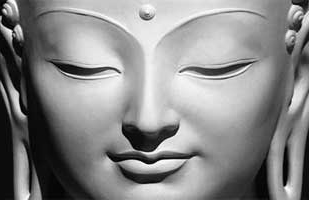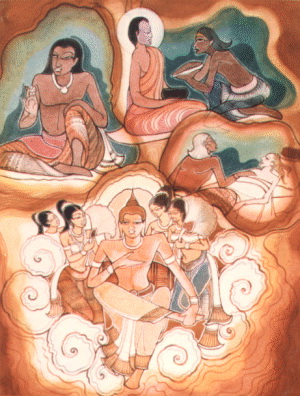
Chapter VI - PANDITA VAGGA - The Wise

GIVE UP EVIL, DO GOOD BE DETACHED TO GAIN PEACE
Kanham dhammam vippahaya sukkam bhavetha pandito
Oka anokam agamma viveke yattha duramam
Tatrabhiratim iccheyya hitva kame akincano
Pariyodapeyya attanam cittaklesehi pandito.
Yesam sambodhi angesu samma cittam subbhavitam
Adana patinissagge anupadaya ye rata
Khinasava jutimanto te loke parinibbutta.
The wise man, leaving the home of craving and having Nibbana as his goal, should give up dark states1 and cultivate pure, good ones. He should seek great delight in solitude, detachment and Nibbana, which an ordinary man finds no delight in. He should also give up sensual pleasures, and clinging to nothing, should purify himself of all mental impurities2 87 - 88
Those, with mind well-developed in the Factors of Enlightenment,3 and who have rid themselves of all craving, rejoice in their abandonment of grasping. Such men, with all moral defilements eradicated, and powerful with the light of Arahanthood have realized Nibbana even in this world.
VI:11 From darkness to brightness
Bhikkhus Assaji and Punabhasuka and their disciples were staying in Kitagiri village. While staying there, they planted fruit trees for their personal gain. They also violated some minor precepts for bhikkhus, thus making the monastery noisy and unconducive for other bhikkhus striving for their spiritual development.
A group of bhikkhus after observing vassa in Kosala came to the Buddha for advice on meditation. The Buddha advised them to give up sensual pleasure and worldly attachment which would pave the way to attain Nibbana.
Notes:
- The dark states (kanham dhammam) are the ten kinds of evil deeds, and the bright states (sukkam) are the ten kinds of good deeds.
- Ten kinds of evil-deeds - namely, 1. killing 2. stealing 3. sexual misconduct 4. lying 5. slandering 6. harsh speech 7. vain talk 8. covetousness 9. ill-will and 10. false belief.
- Ten kinds of meritorious deeds (kusala) - namely, 1. generosity 2. morality 3. meditation 4. reverence 5. service 6. transference of merit 7. rejoicing in others' merit 8. hearing the doctrine 9. expounding the doctrine and 10. straightening one's views.

Editor for Buddha brothers: Matthew Laird Acred
If you should encounter any bugs broken links, or display errors just email us.
Buddha brothers has been running since Aug 2010 and can continue to run with your kind help!
If you love our website please donate so we can make this site even better !!